人教版初三英语unit12知识点归纳
人教版九年级英语unit12知识点归纳
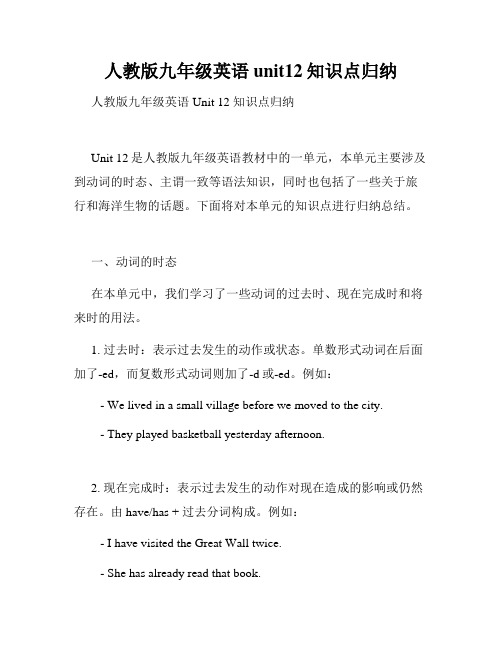
人教版九年级英语unit12知识点归纳人教版九年级英语Unit 12 知识点归纳Unit 12是人教版九年级英语教材中的一单元,本单元主要涉及到动词的时态、主谓一致等语法知识,同时也包括了一些关于旅行和海洋生物的话题。
下面将对本单元的知识点进行归纳总结。
一、动词的时态在本单元中,我们学习了一些动词的过去时、现在完成时和将来时的用法。
1. 过去时:表示过去发生的动作或状态。
单数形式动词在后面加了-ed,而复数形式动词则加了-d或-ed。
例如:- We lived in a small village before we moved to the city.- They played basketball yesterday afternoon.2. 现在完成时:表示过去发生的动作对现在造成的影响或仍然存在。
由have/has + 过去分词构成。
例如:- I have visited the Great Wall twice.- She has already read that book.3. 将来时:表示将来要发生的动作或存在的状态。
由will + 动词原形构成。
例如:- We will go to the beach tomorrow.- They will have a party next week.二、主谓一致主谓一致是指主语和谓语在人称和数上保持一致。
在本单元中,我们需要特别注意以下几点:1. 主语为第三人称单数时,谓语动词需要加-s或-es。
例如:- He often goes to the cinema on weekends.2. 表示时间、距离、金钱等的量词作主语时,谓语动词的单复数形式与它们代表的数量有关。
例如:- Ten yuan is enough to buy a drink.三、旅行话题在本单元中,我们学习了一些与旅行相关的词汇和句型,并通过对话的形式来进行实际应用。
人教版九年级英语Unit12单元知识点梳理
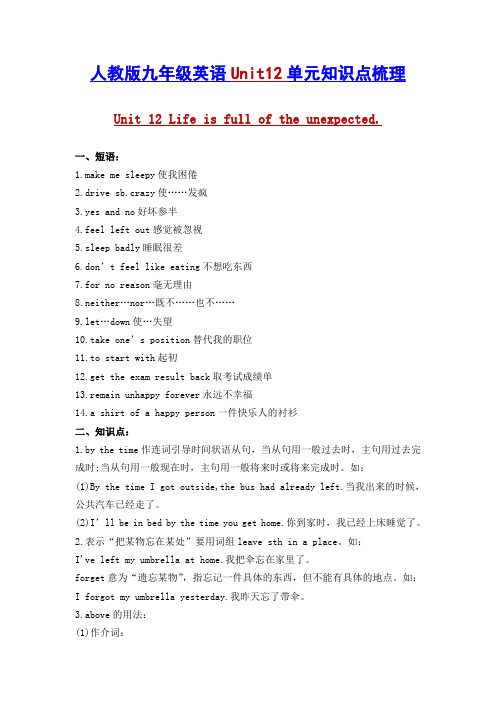
一、短语:1.make me sleepy使我困倦2.drive sb.crazy使……发疯3.yes and no好坏参半4.feel left out感觉被忽视5.sleep badly睡眠很差6.don’t feel like eating不想吃东西7.for no reason毫无理由8.neither…nor…既不……也不……9.let…down使…失望10.take one’s position替代我的职位11.to start with起初12.get the exam result back取考试成绩单13.remain unhappy forever永远不幸福14.a shirt of a happy person一件快乐人的衬衫二、知识点:1.by the time作连词引导时间状语从句,当从句用一般过去时,主句用过去完成时;当从句用一般现在时,主句用一般将来时或将来完成时。
如:(1)By the time I got outside,the bus had already left.当我出来的时候,公共汽车已经走了。
(2)I’ll be in bed by the time you get home.你到家时,我已经上床睡觉了。
2.表示“把某物忘在某处”要用词组leave sth in a place。
如:I've left my umbrella at home.我把伞忘在家里了。
forget意为“遗忘某物”,指忘记一件具体的东西,但不能有具体的地点。
如:I forgot my umbrella yesterday.我昨天忘了带伞。
3.above的用法:(1)作介词:在……上面,如:The moon is above the trees now.月亮现在正位于树梢上。
‚在…之上,超过,如:They are children above six years old.他们是六岁以上的孩子。
人教版九年级英语第十二单元知识点总结
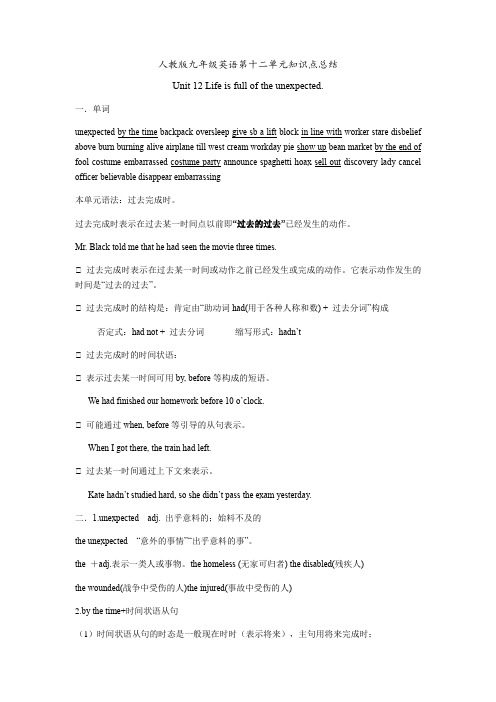
人教版九年级英语第十二单元知识点总结Unit 12 Life is full of the unexpected.一.单词unexpected by the time backpack oversleep give sb a lift block in line with worker stare disbelief above burn burning alive airplane till west cream workday pie show up bean market by the end of fool costume embarrassed costume party announce spaghetti hoax sell out discovery lady cancel officer believable disappear embarrassing本单元语法:过去完成时。
过去完成时表示在过去某一时间点以前即“过去的过去”已经发生的动作。
Mr. Black told me that he had seen the movie three times.⑴ 过去完成时表示在过去某一时间或动作之前已经发生或完成的动作。
它表示动作发生的时间是“过去的过去”。
⑴ 过去完成时的结构是:肯定由“助动词had(用于各种人称和数) + 过去分词”构成否定式:had not + 过去分词缩写形式:hadn’t⑴ 过去完成时的时间状语:⑴ 表示过去某一时间可用by, before等构成的短语。
We had finished our homework before 10 o’clock.⑴ 可能通过when, before等引导的从句表示。
When I got there, the train had left.⑴ 过去某一时间通过上下文来表示。
Kate hadn’t studied hard, so she didn’t pass the exam yesterday.二.1.unexpected adj. 出乎意料的;始料不及的the unexpected “意外的事情”“出乎意料的事”。
(完整版)九年级英语人教版新课标Unit12.Lifeisfulloftheunexpected知识点详解..

Unit12. Life is full of the unexpected课文知识点详解Section A.1.Life is full of the unexpected. 生活充满了意外。
(标题)【解析1】be full of = be filled with充满,装满【解析2】unexpected adj. 出乎意料的;始料不及的the unexpected “意外的事情”“出乎意料的事”。
the +adj.表示一类人或事物。
英语中,有些形容词与定冠词the连用,表示一类人或事物,在句子中起名词的作用。
the homeless (无家可归者) the disabled(残疾人)2. By the time I got outside, the bus had already left. 当我出来时,公共汽车已经离开了。
(1b)【解析】by the time 在……以前,指从过去的某一点到从句所示的时间为止,常引导表示过去的时间状语从句,主句常用过去完成时,即had+动词过去分词。
By the time I got up, he had already left. 当我起床时,他已经离开了。
【拓展】by now 表示“到现在为止”,通常与现在完成时连用。
By now I have collected 200 dolls. 到现在为止,我已收集了二百个布娃娃。
3. When I got to school, I realized I had left my backpack at home.(1b)当我到学校时我意识到我把书包忘在家里了。
【解析】leave sth. +地点“把某物忘在某处”forget意为“遗忘某物”,指忘记一件具体的东西,但不能有具体的地点。
I left my book on the desk. 我把书忘在了桌子上。
I forgot my umbrella yesterday .我昨天忘了带伞。
人教版九年级全一册英语 Unit 12 重点语法知识点复习提纲
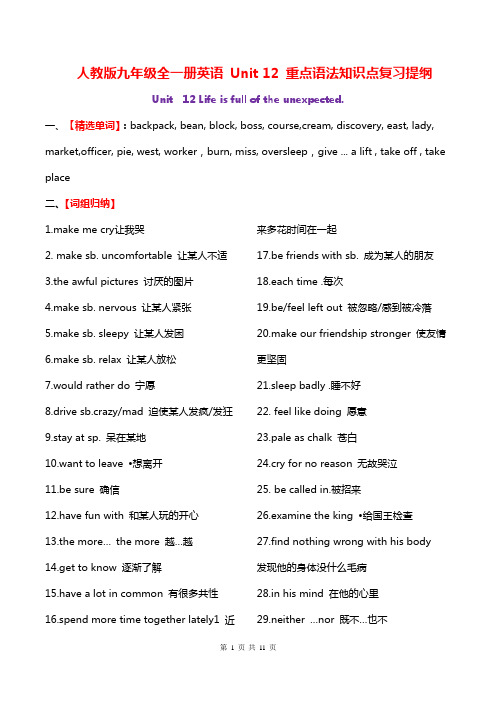
人教版九年级全一册英语Unit 12 重点语法知识点复习提纲Unit 12 Life is full of the unexpected.一、【精选单词】:backpack, bean, block, boss, course,cream, discovery, east, lady, market,officer, pie, west, worker,burn, miss, oversleep,give ... a lift , take off , take place二、【词组归纳】1.make me cry让我哭2. make sb. uncomfortable 让某人不适3.the awful pictures 讨厌的图片4.make sb. nervous 让某人紧张5.make sb. sleepy 让某人发困6.make sb. relax 让某人放松7.would rather do 宁愿8.drive sb.crazy/mad 迫使某人发疯/发狂9.stay at sp. 呆在某地10.want to leave •想离开11.be sure 确信12.have fun with 和某人玩的开心13.the more…the more 越…越14.get to know 逐渐了解15.have a lot in common 有很多共性16.spend more time together lately1 近来多花时间在一起17.be friends with sb. 成为某人的朋友18.each time .每次19.be/feel left out 被忽略/感到被冷落20.make our friendship stronger 使友情更坚固21.sleep badly .睡不好22. feel like doing 愿意23.pale as chalk 苍白24.cry for no reason 无故哭泣25. be called in.被招来26.examine the king •给国王检查27.find nothing wrong with his body 发现他的身体没什么毛病28.in his mind 在他的心里29.neither …nor 既不…也不30.the prime minister 首相31.explain the situation to sb. 向某人解释情况32.have a lot of power 有很大权力33.be worried about /worry about 担心34.lose my power 失去权力35.take one’s position/place 代替某人36.have a lot of wealth 有大量财富37.it’s true that ….是真的38.be followed by 被追随39.top general 大将军40. in three days’time •••三天时间后41.to start with 起初,开始时42.throw rubbish 扔垃圾43.clean up the streets 打扫大街44.get...back 取回,要回45.hand back 发下46. answer well 答的好47.remain unhappy 依然不开心48.a person with power and money 一个有钱有势的人49.search for 搜寻50.even though 即使51.a heavy weight on his shoulders 重担压在肩上52.walk home alone 独自走回家53.the worst day of his life 一生中最糟糕的一天54.stop doing/to do 停止正在做/去干55.think about 考虑56.on the soccer field 在足球场57.miss doing 错过做...58.let sb. down •12.使...失望59.kick sb. off ••开除某人•60.as soon as 一...就61.walk through the door 走过门62.without another word 没有再说一句话63.hear sb. doing 听到某人正在做64.knock on the door 敲门65.let sb. in .让某人进入66.be too hard on sb. 对某人苛刻/严厉67.team effort 团队努力68.the only reason 唯一理由69.support each other.相互支持municate with 同...沟通/交流71. learn from 向...学习72.do sth. with courage ••••有勇气做某事73.rather than 而不是74.fear in his heart 心中的恐惧75.be close to 靠近,接近76.pull together 齐心协力77.to his surprise and relief 令他吃惊和欣慰的78.nod in agreement 点头同意79.not one person's fault 不是一个人的错80.feel lucky to do 感觉幸运地做...81. be on a winning team .在一个会赢的队伍中82.miss a goal .失球83.offer sb. sth.=offer sth. to sb. .给某人提供某物84.be asked to leave 被请求离开85.put so much pressure on sb. ••给某人施加如此多的压力86.work hard together .团结协作,齐心协力87.win /lose a competition 赢/失去比赛88.perform sth. well/badly 表演什么好/坏89.in front of a big group of people 在一大群人面前90.get into a fight with sb. 与某人打架/争吵91. follow me around …到处跟着我 ...三、【重点句式】;1.Life is full of the unexpected. 生活充满了意料之外的事。
人教版九年级全一册英语Unit12单元语法知识点总结
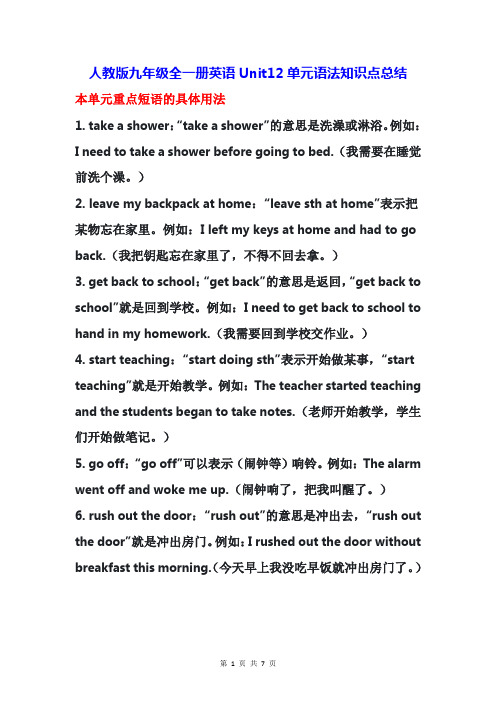
人教版九年级全一册英语Unit12单元语法知识点总结本单元重点短语的具体用法1. take a shower:“take a shower”的意思是洗澡或淋浴。
例如:I need to take a shower before going to bed.(我需要在睡觉前洗个澡。
)2. leave my backpack at home:“leave sth at home”表示把某物忘在家里。
例如:I left my keys at home and had to go back.(我把钥匙忘在家里了,不得不回去拿。
)3. get back to school:“get back”的意思是返回,“get back to school”就是回到学校。
例如:I need to get back to school to hand in my homework.(我需要回到学校交作业。
)4. start teaching:“start doing sth”表示开始做某事,“start teaching”就是开始教学。
例如:The teacher started teaching and the students began to take notes.(老师开始教学,学生们开始做笔记。
)5. go off:“go off”可以表示(闹钟等)响铃。
例如:The alarm went off and woke me up.(闹钟响了,把我叫醒了。
)6. rush out the door:“rush out”的意思是冲出去,“rush out the door”就是冲出房门。
例如:I rushed out the door without breakfast this morning.(今天早上我没吃早饭就冲出房门了。
)7. give sb a lift:“give sb a lift”的意思是让某人搭车、捎某人一程。
人教版英语九年级全册Unit12知识点归纳讲解和写作指导
Unit12 知识点归纳讲解和写作指导重点知识归纳Section Atake a shower洗淋浴by the time ...在... 以前alarm clock 闹钟go off (闹钟)发出响声keep doing sth. 一直做某事wake up 醒来put on some clothes穿上衣服rush out of the door 冲出门夕卜give ... a lift 捎... 一程at least 至少be five minutes late for class上课迟至U 5 分钟be full of ...充满...arrive at 至达be about to do sth.正要做某事eve n though即使;尽管wait in line with ... 与.... 一起排队等待go on 继续;发生stare at sb. / sth盯着某人/某物in disbelief 不信;怀疑地jump out of bed 从床上跳下来go straight to the airport 直奔机场miss my pla ne 误了航班think to oneself 心中想;盘算wait till the next day 等至第二天hear about 听说the day before 前一天turn into 变成show up 露面;赶到by the end of在(某时间点)以前Section Bget dressed穿上衣服costume party化装舞会stay up all night 整晚熬夜April Fool ' san in troduct ion to ...对.. 的介绍take place 发生local supermarkets当地的超市sell out 卖光lose weight 减肥find out 弄清;查明end up doi ng sth .以做某事告终get married 结婚cancel his show取消他的节目hun dreds of成百上千的;数以百计的thousa nds of成千上万的;数以千计的police officers 警官rush to ...匆忙去...more tha n超过;多于run away from 逃离on the first day of school 在上学第一天turn around 转向;回转hand in 上交重点知识点讲解1. alive 作形容词,意为“活着;有生气的”,在句中可作表语、后置定语或宾语补足语。
人教版九年级英语Unit12知识点总结
Unit 12 Life is full of the unexpected.重点单词:Unexpected, backpack, oversleep, ring, block, woker, stare, above, burn, alive, airport, till, west, cream, pie, bean, market, fool, discovery, lady, cancel, officer, believable, disappear.重点短语:by the time 在……之前get up 起床be full of 充满give…a lift 捎(某人)一程go off 响铃rush out 冲出wake up 醒来at least 至少;反正be about to 将要go on 发生;向前走stare at 盯着……看in disbelief 怀疑地in line with (与……)成一排turn into 变成take off 起飞jump out of 从……跳下show up 赶到by the end of 在(某时间点)以前get dressed 穿衣服stay up 熬夜April Fool’s Day 愚人节Costume party 化妆舞会Sell out 卖光Take place 发生Play jokes on sb. 和某人开玩笑End up 以……结束Get married to 和……结婚Police officer 警官Run out of 用完a piece of 一张重点句式;Life is full of the unexpected.生活充满了意料之外的事。
When I got to school,I realized I had left my backpack at home.当我到达学校的时候,我意识到我把背包忘在家里了。
人教版九年级unit12知识点
人教版九年级unit12知识点人教版九年级Unit 12知识点Unit 12: Can you be my Chinese pen friend?本单元主要围绕学生是否能够成为彼此的笔友展开,涉及到信件写作、文化交流等方面的知识。
以下是本单元的重点内容。
一、词汇与短语1. pen friend:笔友2. introduce:介绍3. communicate:交流4. foreign:外国的5. country:国家6. habit:习惯7. similar:相似的8. different:不同的9. respect:尊重10. traditional:传统的二、语法与句型1. 一般现在时:常用于描述现在情况或日常习惯,如:I live in China.(我住在中国。
)2. there be句型:用于描述某地有某物或某人。
如:There is a park near my house.(在我家附近有个公园。
)3. 直接引语与间接引语:直接引语是直接引述他人的话语,用引号标注;间接引语是对他人说话的间接转述,不使用引号。
如:He said, "I love playing soccer."(他说:“我喜欢踢足球。
”)→He said that he loved playing soccer.(他说他喜欢踢足球。
)三、重点句子1. Can you introduce yourself?(你能介绍一下自己吗?) - Yes, of course. My name is Tom. I'm from the United States.(是的,当然可以。
我的名字叫汤姆。
我来自美国。
)2. What's your daily routine? (你的日常作息是怎样的?)- I usually get up at 7 o'clock in the morning and have breakfast at 7:30.(我通常早上7点起床,7点半吃早饭。
Unit12重点知识人教版九年级英语全册
九年级Unit 12重点知识一词形词块拓展①agree v. 同意,赞成,应允→disagree v. 不同意,有分歧→ agreement n. 一致,同意→disagreement n. 意见不一,分歧,争论② disappoint v.使失望→disappointment n. 失望;沮丧;扫兴→disappointed adj. 失望的;沮丧的;失意的→disappointing adj. 令人失望的,令人沮丧的,令人扫兴的③ expect v. 预料;期待→expectation n.期待→expected adj. 预料的,预期的→unexpected adj. 出乎意料的;始料不及的④ oversleep v. →overslept(过去式/过去分词)睡过头,睡得太久⑤ burn v. →burned/burnt (过去式/过去分词)→burning (现在分词)着火,燃烧→burning(adj.)着火的,燃烧的get burnt 被晒伤⑥ believe v.相信;认为有可能→belief n. 相信,信仰,信念→believable adj. 可相信的,可信任的;→unbelievable adj. 难以置信的,不真实的→disbelief n.不信,怀疑⑦ work v. 工作n. 作品→worker n. 工作者;工人⑧ fool v. 愚弄→foolish adj. 愚蠢的;→n. 蠢人,傻瓜二重点短语by the time....在.....以前go off (闹钟)发出响声rush out of the door 冲出门外give.....a lift 捎.....一程at least 至少be full of....充满.....be five minutes late for class 上课迟到5分钟even though 即使;尽管wait in line with 和.....排队等候go on 继续,发生stare at sb./sth. 盯着某人/某物in disbelief 不信;怀疑地jump out of bed 从床上跳下来go straight to the airport 直奔机场think to oneself 心中想,盘算wait till the next day 等到第二天hear about 听说the day before 前一天turn into 变成show up 露面;赶到by the end of 在(某时间点)以前get dressed 穿上衣服costume party 化装舞会stay up all night 整晚熬夜April Fool's Day 愚人节an introduction to...对...的介绍take place 发生sell out 卖光lose weight 减肥find out 弄清,查明cancel one's show 取消某人的节目police officers 警官rush to...匆忙去... more than 超过,多于run away from 逃离on the first day of school 在上学第一天turn around 转向;回转hand in 上交be about to do sth. 正要做某事end up doing sth. 以做某事告终across the country 遍及全国spread across the country 传遍全国run out of 用完;耗尽leave my backpack at home 把我的背包忘在家play all kinds of tricks and jokes on each other 互相玩各种各样的把戏和玩笑三.Grammar过去完成时1.When I got to school, I realized I had left my backpack at home.2.By the time I got back to school, the bell had rung.3.But before I got to the bus stop, the bus had already left.Summary:1)意义:过去完成时表示过去某个时间或某个动作____发生的动作,它表示动作发生的时间是“________________”,它是一种相对于___________的时态,没有_________________就没有过去完成时态。
- 1、下载文档前请自行甄别文档内容的完整性,平台不提供额外的编辑、内容补充、找答案等附加服务。
- 2、"仅部分预览"的文档,不可在线预览部分如存在完整性等问题,可反馈申请退款(可完整预览的文档不适用该条件!)。
- 3、如文档侵犯您的权益,请联系客服反馈,我们会尽快为您处理(人工客服工作时间:9:00-18:30)。
Unit12
课文知识点
1.by the time 在……以前
2.Leave sb. by oneself 把某人单独留下leave sth. +地点把某物忘在某处
3.Go off 闹钟响,食品变质,停水断电等
4.rush out of 冲出……,奔出……
5.give sb. a lift 捎某人一程
6.end up doing sth. 以……告终,结尾
7.Be full of…… 充满,满是…… be filled with 被装满……
8.Be about to do sth. 刚要做某事,即将做某事
9.The +形容词表示一类人
10.D ecide to do sth. 决定做某事
11.I n line with…… 与……成一排
形或副,句末叹号要记住。
14.n ot……until…… 直到……才……
15.T urn into 把……变成…… turn……into……
18.L eave for 动身前往某地by the end of 到……结束时,在……之前
19.F ool sb. Into doing sth. 欺骗某人做某事
20.G et dress 穿衣服,强调动作。
be dressed in 穿着……
21.S tay up 熬夜run away from 逃离……
22.P lay jokes/tricks on sb. 作弄某人,开某人玩笑
23.S top doing sth. 停止做某事stop to do sth. 停下来做某事
24.A s much+不可数名词+as one can/could 尽可能多的……
25.H undreds of 数百,成百上千的……
26.W hole所有的修饰可数名词,限定词/数词+whole+名词
All所有的可修饰可数名词复数,不可数名词。
单元语法
过去完成时
一、意义:在过去某个时间或某个动作之前发生的动作或者存在的状态。
动作发生的时间是“过去的过去”。
二、过去完成时的构成:助动词have+过去分词
否定式为:had not+过去分词
三、过去完成时的用法:
1.表示一个动作或者状态在过去某一时间或者动作之前已经完成。
过去的时间可以用by,before等介词或一个时间状语从句来表示。
When I woke up, it had stopped raining.
2.表示某一动作或者状态在过去某时之前已经开始,一直延续到这一过去的时间。
与表示延续的时间状语连用:by the end of + 过去的时间,by the time + 从句(一般过去时)。
By the end of last year, she had worked in the factory for twenty years.
四、过去完成时的判断依据:
1.由时间状语来判定:by+过去的时间点,by the end of +过去的时间
2.由“过去的过去”来判定,指的是过去某一动作之前已经发生或者完成的动作,即动作有先后关系,动作在前的用过去完成时,动作在后的用一般过去时。
①含有宾语从句的复合句中:当主句为一般过去时,且从句的动作先于主句的动作发生时,从句用过去完成时。
②含有状语从句的复合句中:含有时间、原因、方式等状语从句的复合句中,主从句的动作发生有先后关系,动作在前的要用过去完成时,动作在后的要用一般过去时。
③根据上下文判定。
